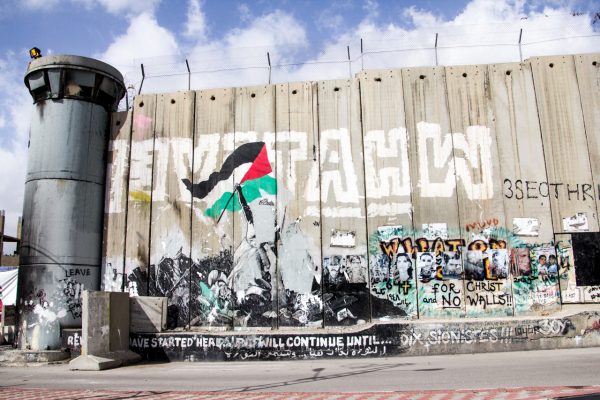 Photo Credit: The Cradle
Photo Credit: The Cradle
Hamas’ Operation Al-Aqsa Flood was meticulously planned. The launch date was conditioned by two triggering factors.
First was Israeli Prime Minister Benjamin Netanyahu flaunting his ‘New Middle East’ map at the UN General Assembly in September, in which he completely erased Palestine and made a mockery of every single UN resolution on the subject.
Second are the serial provocations at the holy Al-Aqsa Mosque in Jerusalem, including the straw that broke the camel’s back: two days before Al-Aqsa Flood, on 5 October, at least 800 Israeli settlers launched an assault around the mosque, beating pilgrims, destroying Palestinian shops, all under the observation of Israeli security forces.
Everyone with a functioning brain knows Al-Aqsa is a definitive red line, not just for Palestinians, but for the entire Arab and Muslim worlds.
It gets worse. The Israelis have now invoked the rhetoric of a “Pearl Harbor.” This is as threatening as it gets. The original Pearl Harbor was the American excuse to enter a world war and nuke Japan, and this “Pearl Harbor” may be Tel Aviv’s justification to launch a Gaza genocide.
Sections of the west applauding the upcoming ethnic cleansing – including Zionists posing as “analysts” saying out loud that the “population transfers” that began in 1948 “must be completed” – believe that with massive weaponry and massive media coverage, they can turn things around in short shrift, annihilate the Palestinian resistance, and leave Hamas allies like Hezbollah and Iran weakened.
Their Ukraine Project has sputtered, leaving not just egg on powerful faces, but entire European economies in ruin. Yet as one door closes, another one opens: Jump from ally Ukraine to ally Israel, and hone your sights on adversary Iran instead of adversary Russia.
There are other good reasons to go all guns blazing. A peaceful West Asia means Syria reconstruction – in which China is now officially involved; active redevelopment for Iraq and Lebanon; Iran and Saudi Arabia as part of BRICS 11; the Russia-China strategic partnership fully respected and interacting with all regional players, including key US allies in the Persian Gulf.
Incompetence. Willful strategy. Or both.
That brings us to the cost of launching this new “war on terror.” The propaganda is in full swing. For Netanyahu in Tel Aviv, Hamas is ISIS. For Volodymyr Zelensky in Kiev, Hamas is Russia. Over one October weekend, the war in Ukraine was completely forgotten by western mainstream media. Brandenburg Gate, the Eiffel tower, the Brazilian Senate are all Israeli now.
Egyptian intel claims it warned Tel Aviv about an imminent attack from Hamas. The Israelis chose to ignore it, as they did the Hamas training drills they observed in the weeks prior, smug in their superior knowledge that Palestinians would never have the audacity to launch a liberation operation.
Whatever happens next, Al-Aqsa Flood has already, irretrievably, shattered the hefty pop mythology around the invincibility of Tsahal, Mossad, Shin Bet, Merkava tank, Iron Dome, and the Israel Defense Forces.
Even as it ditched electronic communications, Hamas profited from the glaring collapse of Israel’s multi-billion-dollar electronic systems monitoring the most surveilled border on the planet.
Cheap Palestinian drones hit multiple sensor towers, facilitated the advance of a paragliding infantry, and cleared the way for T-shirted, AK-47-wielding assault teams to inflict breaks in the wall and cross a border that even stray cats dared not.
Israel, inevitably, turned to battering the Gaza Strip, an encircled cage of 365 square kilometers packed with 2.3 million people. The indiscriminate bombing of refugee camps, schools, civilian apartment blocks, mosques, and slums has begun. Palestinians have no navy, no air force, no artillery units, no armored fighting vehicles, and no professional army. They have little to no high-tech surveillance access, while Israel can call up NATO data if they want it.
Israeli Defense Minister Yoav Gallant proclaimed “a complete siege on the Gaza Strip. There will be no electricity, no food, no fuel, everything is closed. We are fighting human animals and we will act accordingly.”
The Israelis can merrily engage in collective punishment because, with three guaranteed UNSC vetoes in their back pocket, they know they can get away with it.
It doesn’t matter that Haaretz, Israel’s most respected newspaper, straight out concedes that “actually the Israeli government is solely responsible for what happened (Al-Aqsa Flood) for denying the rights of Palestinians.”
The Israelis are nothing if not consistent. Back in 2007, then-Israeli Defense Intelligence Chief Amos Yadlin said, “Israel would be happy if Hamas took over Gaza because IDF could then deal with Gaza as a hostile state.”
Ukraine funnels weapons to Palestinians
Only one year ago, the sweaty sweatshirt comedian in Kiev was talking about turning Ukraine into a “big Israel,” and was duly applauded by a bunch of Atlantic Council bots.
Well, it turned out quite differently. As an old-school Deep State source just informed me:
“Ukraine-earmarked weapons are ending up in the hands of the Palestinians. The question is which country is paying for it. Iran just made a deal with the US for six billion dollars and it is unlikely Iran would jeopardize that. I have a source who gave me the name of the country but I cannot reveal it. The fact is that Ukrainian weapons are going to the Gaza Strip and they are being paid for but not by Iran.”
After its stunning raid last weekend, a savvy Hamas has already secured more negotiating leverage than Palestinians have wielded in decades. Significantly, while peace talks are supported by China, Russia, Turkiye, Saudi Arabia, and Egypt – Tel Aviv refuses. Netanyahu is obsessed with razing Gaza to the ground, but if that happens, a wider regional war is nearly inevitable.
Lebanon’s Hezbollah – a staunch Resistance Axis ally of the Palestinian resistance – would rather not be dragged into a war that can be devastating on its side of the border, but that could change if Israel perpetrates a de facto Gaza genocide.
Hezbollah holds at least 100,000 ballistic missiles and rockets, from Katyusha (range: 40 km) to Fajr-5 (75 km), Khaibar-1 (100 km), Zelzal 2 (210 km), Fateh-110 (300 km), and Scud B-C (500 km). Tel Aviv knows what that means, and shudders at the frequent warnings by Hezbollah leader Hassan Nasrallah that its next war with Israel will be conducted inside that country.
Which brings us to Iran.
Geopolitical plausible deniability
The key immediate consequence of Al-Aqsa Flood is that the Washington neocon wet dream of “normalization” between Israel and the Arab world will simply vanish if this turns into a Long War.
Large swathes of the Arab world in fact are already normalizing their ties with Tehran – and not only inside the newly expanded BRICS 11.
In the drive towards a multipolar world, represented by BRICS 11, the Shanghai Cooperation Organization (SCO), Eurasian Economic Union (EAEU), and China’s Belt and Road Initiative (BRI), among other groundbreaking Eurasian and Global South institutions, there’s simply no place for an ethnocentric Apartheid state fond of collective punishment.
Just this year, Israel found itself disinvited from the African Union summit. An Israeli delegation showed up anyway, and was unceremoniously ejected from the big hall, a visual that went viral. At the UN plenary sessions last month, a lone Israeli diplomat sought to disrupt Iranian President Ibrahim Raisi’s speech. No western ally stood by his side, and he too, was ejected from the premises.
As Chinese President Xi Jinping diplomatically put it in December 2022, Beijing “firmly supports the establishment of an independent state of Palestine that enjoys full sovereignty based on 1967 borders and with East Jerusalem as its capital. China supports Palestine in becoming a full member of the United Nations.”
Tehran’s strategy is way more ambitious – offering strategic advice to West Asian resistance movements from the Levant to the Persian Gulf: Hezbollah, Ansarallah, Hashd al-Shaabi, Kataib Hezbollah, Hamas, Palestinian Islamic Jihad, and countless others. It’s as if they are all part of a new Grand Chessboard de facto supervised by Grandmaster Iran.
The pieces in the chessboard were carefully positioned by none other than the late Quds Force Commander of the Islamic Revolutionary Guard Corps General Qassem Soleimani, a once-in-a-lifetime military genius. He was instrumental in creating the foundations for the cumulative successes of Iranian allies in Lebanon, Syria, Iraq, Yemen, and Palestine, as well as creating the conditions for a complex operation such as Al-Aqsa Flood.
Elsewhere in the region, the Atlanticist drive of opening strategic corridors across the Five Seas – the Caspian, the Black Sea, the Red Sea, the Persian Gulf, and the Eastern Mediterranean – is floundering badly.
Russia and Iran are already smashing US designs in the Caspian – via the International North-South Transportation Corridor (INSTC) – and the Black Sea, which is on the way to becoming a Russian lake. Tehran is paying very close attention to Moscow’s strategy in Ukraine, even as it refines its own strategy on how to debilitate the Hegemon without direct involvement: call it geopolitical plausible deniability.
Bye bye EU-Israel-Saudi-India corridor
The Russia-China-Iran alliance has been demonized as the new “axis of evil” by western neocons. That infantile rage betrays cosmic impotence. These are Real Sovereigns that can’t be messed with, and if they are, the price to pay is unthinkable.
A key example: if Iran under attack by a US-Israeli axis decided to block the Strait of Hormuz, the global energy crisis would skyrocket, and the collapse of the western economy under the weight of quadrillions of derivatives would be inevitable.
What this means, in the immediate future, is that he American Dream of interfering across the Five Seas does not even qualify as a mirage. Al-Aqsa Flood has also just buried the recently-announced and much-ballyhooed EU-Israel-Saudi Arabia-India transportation corridor.
China is keenly aware of all this incandescence taking place only a week before its 3rd Belt and Road Forum in Beijing. At stake are the BRI connectivity corridors that matter – across the Heartland, across Russia, plus the Maritime Silk Road and the Arctic Silk Road.
Then there’s the INSTC linking Russia, Iran and India – and by ancillary extension, the Gulf monarchies.
The geopolitical repercussions of Al-Aqsa Flood will speed up Russia, China and Iran’s interconnected geoeconomic and logistical connections, bypassing the Hegemon and its Empire of Bases. Increased trade and non-stop cargo movement are all about (good) business. On equal terms, with mutual respect – not exactly the War Party’s scenario for a destabilized West Asia.
Oh, the things that a slow-moving paragliding infantry overflying a wall can accelerate.
First published at The Cradle.
Pepe Escobar is the author of Globalistan: How the Globalized World is Dissolving into Liquid War (Nimble Books, 2007) and Obama does Globalistan (Nimble Books, 2009). He may be reached at pepeasia@yahoo.com. Read other articles by Pepe.

 Photo Credit: The Cradle
Photo Credit: The Cradle






